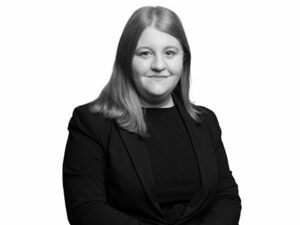
Find Barrister by Expertise:
- View All
- Personal Injury
- Travel & International Law
- Civil Fraud
- Employment
- Crime & Criminal Fraud
- Health & Safety
- Clinical Negligence
- Regulatory & Disciplinary
- Property Damage
- Inquests
- General Common Law
- Industrial Disease
- Insurance
- Sports Law
- Credit Hire
- Professional Negligence
- Public Inquiries
- Public Law
- Trusts & Probate
- Costs
- Mediation & Arbitration
- Commercial
- Public Access
- Education
- Travel and Tourism

July marks Disability Pride Month, a month to celebrate the disabled community whilst also raising awareness of the issues faced by disabled people.
Current figures estimate that approximately 23% of the working age population are disabled (see here), yet within the legal profession only around 6% of solicitors report being disabled (see here), and around 4.4% of the bar declared a disability as of 2022 (see here).
It is therefore perhaps not surprising that is fairly common to see outdated language and phrasing used to describe disability in legal documents. Language is an incredibly powerful tool, especially for lawyers, and so it is important that historical negative language is avoided where possible.
This article would be far too long if it were to list every example of language associated with disabled people, but an example that is often seen in personal injury work is that someone “suffers” from a condition. Whilst using emotive language such as this may be seen to be helpful to demonstrate the impact an injury may have had; it can amplify the negative connotations sometimes associated with being disabled. Using phrases such as “someone has [condition]” or “has been diagnosed with [condition]” is more neutral whilst still making the point clear.
It is also common to hear people referred to as “wheelchair-bound” in pleadings, a phrase that is almost universally rejected by the disabled community. Consider instead saying someone “uses a wheelchair” or is a “full-time wheelchair user”. It may seem to be a small change, but it can make a significant difference.
The issue of language within the disabled community can be sensitive, and indeed there is not always clear consensus around the best wording to use. As an example, in the UK the term “disabled person” is widely accepted as the preferred terminology, yet in the USA “person with a disability” is more widely used.
However, there are some general principles that can be applied:
- Avoid using language that has negative connotations;
- Avoid using language that dehumanises people, for example “the disabled” (as opposed to disabled people) or referring to someone as “the wheelchair” (as opposed to “the wheelchair user”);
- Don’t be afraid to use words associated with being disabled in everyday language, as an example when Holly Girven started her second six during pupillage, as a wheelchair user, she still referred to herself as “being on her feet”;
- If in doubt, ask the person concerned what phrase they would prefer.
At Farrar’s Building, we are committed to our Award-winning ESG initiatives and responsibilities, including supporting disability at the Bar. Farrar’s Building is proud to be one of only a few chambers in Temple to be fully wheelchair accessible and have an accessible toilet and wet room. We are also aware that accessibility is far more than access to a building, and Farrar’s Building are committed to improving access to the Bar for disabled people, by removing unnecessary barriers and by using inclusive language.